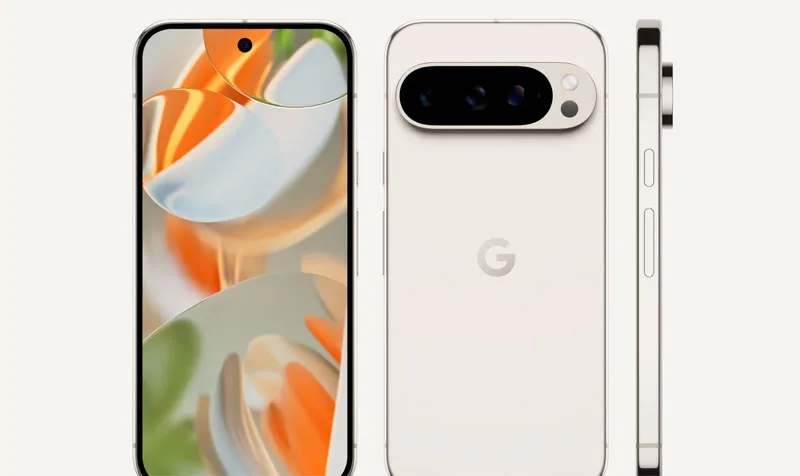A recent Cybernews report has sparked controversy by alleging that the Pixel 9 Pro XL, one of Google’s latest flagship smartphones, transmits personal data to Google servers every 15 minutes. This has raised concerns over privacy and the potential misuse of personal information by the tech giant. While Google has refuted the claims, the issue continues to fuel debates over data privacy in the smartphone industry.
Pixel 9 Pro XL and Personal Data Sharing
The report from Cybernews claims that the Pixel 9 Pro XL sends personal data, including location information, browsing habits, and other user activities, to Google servers at regular 15-minute intervals. This data transmission is said to occur without user consent and has triggered a wave of concern among users and privacy advocates. If true, this would raise serious ethical and legal questions, especially since modern smartphones are expected to uphold strict privacy standards.

According to the report, the personal data shared includes sensitive information such as:
- Location Data: The phone reportedly tracks and sends the user’s location even when the phone’s location services are turned off. This could allow Google to build an extensive profile of a user’s daily movements.
- Browsing Activity: User web searches and browser history are said to be part of the data that is transmitted to Google servers, allowing for more targeted advertising and content recommendations.
- App Usage: The report also claims that app usage patterns and behaviours are being monitored, which could provide insights into a user’s interests and routines.
The most alarming aspect of the report is that this data sharing allegedly happens automatically, without any explicit user permission, and cannot be disabled through traditional settings. Cybernews states that this data transmission occurs every 15 minutes, meaning users are potentially being tracked around the clock.

Google Refuting the Claims
In response to the report, Google was quick to refute the allegations, stating that the claims made by Cybernews were inaccurate and misleading. Google maintains that the Pixel 9 Pro XL complies with industry-standard privacy practices and does not share personal information without user consent.
According to Google, the Cybernews report misinterprets the regular background operations of Android devices, which include routine system updates and diagnostics that help optimize performance. These background activities, Google argues, are not related to the collection or sharing of personal data but are necessary to maintain the smooth functioning of the device.
Google also pointed out that users have full control over their privacy settings, including the ability to turn off location services, restrict app permissions, and manage data-sharing preferences. The company insists that any data that is shared is anonymized and used for product improvements rather than tracking individual users.
The Privacy Debate
This is not the first time Google has faced scrutiny over its privacy practices. As one of the largest data-driven companies in the world, Google’s business model heavily relies on collecting and analyzing vast amounts of data. This allows the company to refine its search algorithms, improve artificial intelligence systems, and provide more personalized services. However, this also puts Google under constant scrutiny regarding its handling of user data.
The allegations against the Pixel 9 Pro XL have reignited long-standing concerns about how much data tech companies collect and how they use it. While Google has consistently defended its practices, critics argue that the company’s data collection methods are often too invasive. For many users, the idea of their personal data being transmitted without explicit consent is a violation of privacy.
The increasing reliance on smartphones for everyday activities – from banking and socializing to healthcare and navigation – has made data privacy a paramount concern for consumers. Privacy advocates argue that tech companies like Google must be more transparent about what data they collect, how it is used, and how users can opt out of such practices.
Legal Implications
If the allegations made by Cybernews were proven to be true, it could lead to significant legal ramifications for Google. Many countries have implemented strict data protection laws, such as the General Data Protection Regulation (GDPR) in the European Union, which places heavy restrictions on how companies collect and process personal data. Non-compliance with these laws can result in hefty fines and damage to a company’s reputation.
Moreover, a discovery of unauthorized data sharing could erode consumer trust in Google’s products. While many users have come to rely on the convenience and innovation provided by Google, privacy concerns can have a lasting impact on brand loyalty. In an age where privacy is increasingly equated with freedom, any misstep by a company like Google could result in users switching to alternative products that offer more transparent privacy policies.
Protecting Personal Privacy
Regardless of the outcome of this controversy, users can take several steps to protect their personal data on smartphones. First, users should familiarize themselves with their phone’s privacy settings, ensuring that location services, app permissions, and data-sharing preferences are properly configured. For instance, disabling unnecessary permissions for apps that don’t need access to certain data can minimize the risk of over-sharing information.
Additionally, users can install privacy-focused apps and services that limit data collection, such as using privacy-centric browsers and virtual private networks (VPNs) to protect browsing activity.
Conclusion
The rumour that the Pixel 9 Pro XL shares personal data with Google has added fuel to an ongoing debate about privacy in the digital age. While Google has refuted the claims, the controversy highlights the need for greater transparency in how tech companies handle user data. As smartphones become more integral to everyday life, consumers are demanding more control over their personal information. The future of smartphone innovation may depend as much on privacy as it does on performance.
source source source source source
Arthur is a senior member of the communications team who has worked at several well-known companies over the past 10 years. As a writer with many years of experience in the technology sector, focusing on reviewing mobile phones and accessories, he has written about many products or has been hands-on with them at some point




